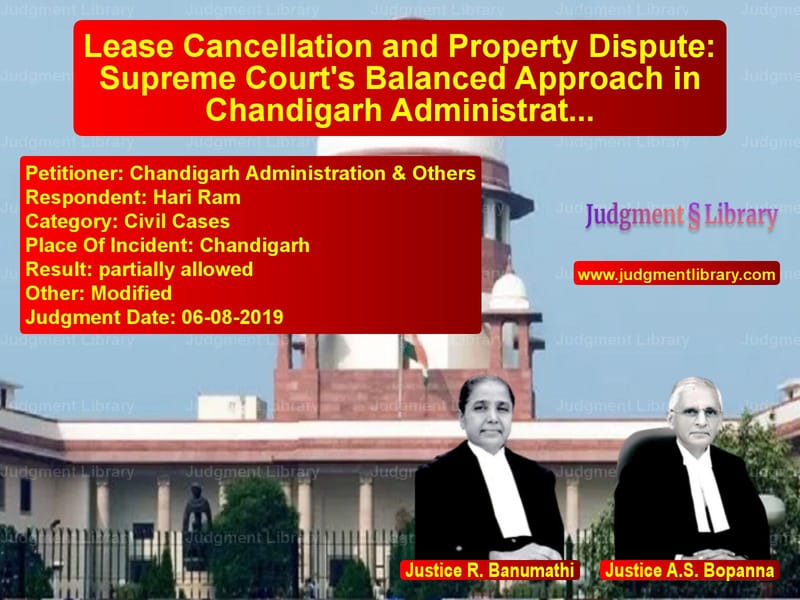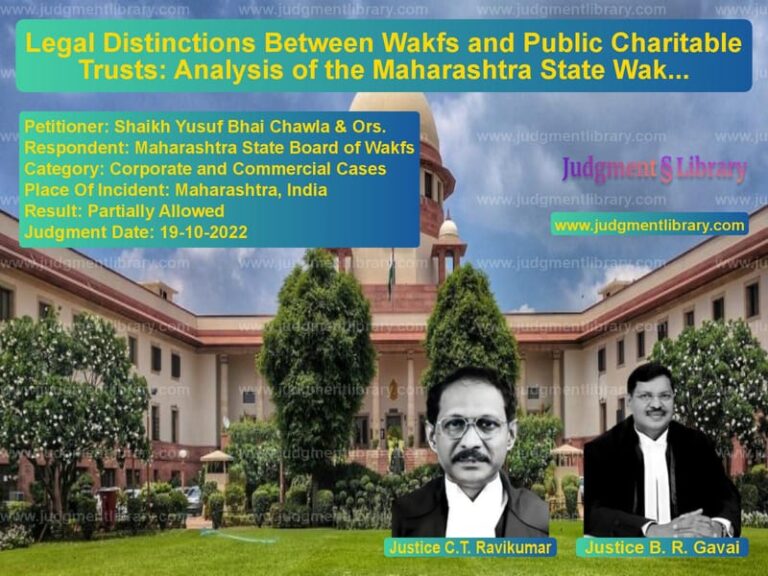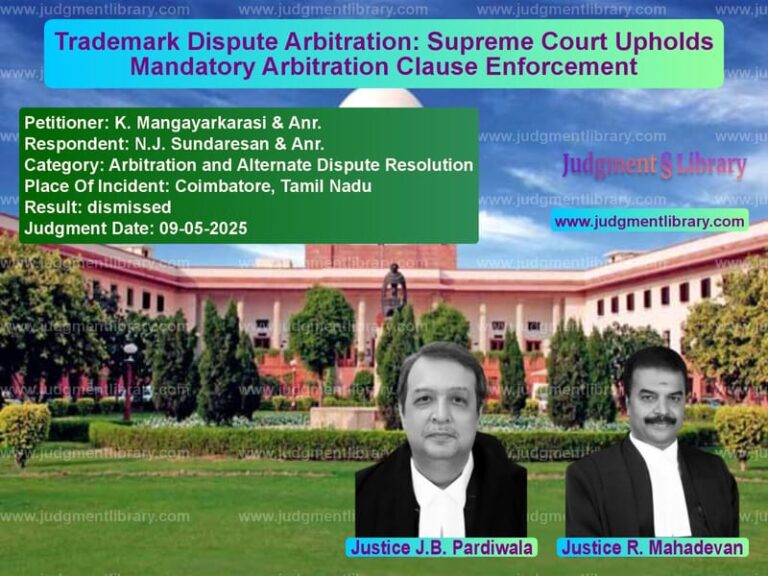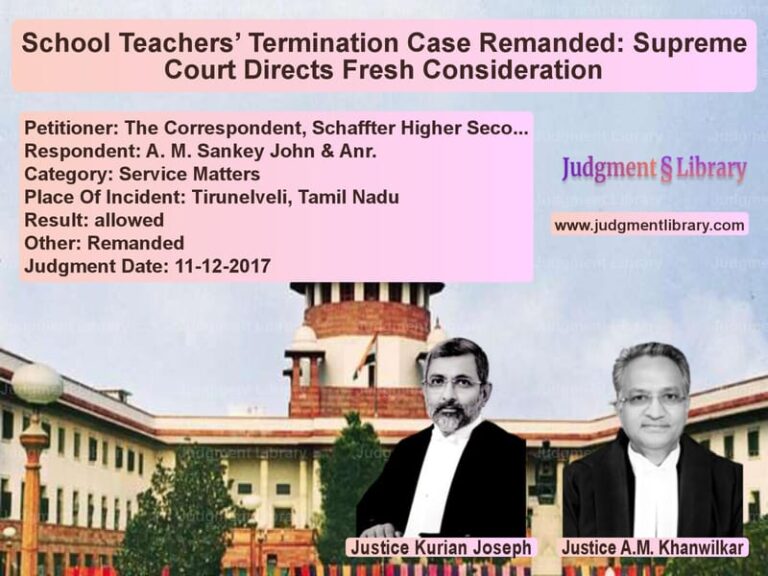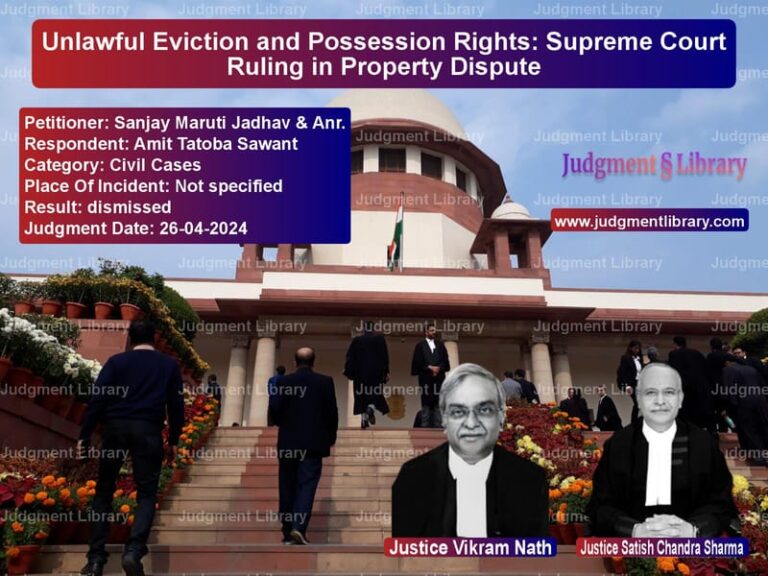Lease Cancellation and Property Dispute: Supreme Court’s Balanced Approach in Chandigarh Administration Case
The case of Chandigarh Administration & Others vs. Hari Ram revolves around a dispute concerning the cancellation of a lease and subsequent eviction from a commercial booth allotted to the respondent. The Supreme Court’s ruling in this case underscores the need for balancing the interests of both the administration and the lessee in disputes involving public property and lease agreements.
The central issue in the case was whether the cancellation of the lease due to non-payment of installments and ground rent was justified, and if the lessee should be given further opportunity to retain the property by paying the outstanding dues.
Background of the Case
The dispute pertained to the allotment of Booth No. 254 in Sector-20D, Chandigarh, which was allotted to the respondent, Hari Ram, on a leasehold basis for a period of 99 years on December 26, 1996. The total premium for the property was set at Rs. 70,500, with the lessee required to pay the balance amount in three annual installments along with ground rent.
However, the respondent failed to pay the first, second, and third installments, which were due on December 25, 1997, December 25, 1998, and December 25, 1999. Despite repeated notices, the respondent did not clear the dues, leading to the cancellation of the lease on June 21, 2006.
Subsequently, an eviction order was issued against the respondent on February 9, 2007, under Section 5(1) of the Public Premises (Eviction of Unauthorized Occupants) Act, 1971. The respondent challenged this order before the Additional District Judge, who set aside the eviction order, stating that the appeal against the cancellation of the lease was still pending.
Petitioner’s Arguments (Chandigarh Administration & Others)
The Chandigarh Administration contended that:
- The respondent was given 26 opportunities over four years to clear the outstanding dues but failed to do so.
- The lease was canceled after multiple warnings, and the eviction was justified under the Public Premises Act.
- The respondent could not be allowed to retain possession of the booth indefinitely without clearing dues.
- The property value had increased significantly since 1996, and the administration could not be compelled to restore the lease at the original price.
Respondent’s Arguments (Hari Ram)
The respondent argued that:
- He was a small trader and was financially incapable of making timely payments.
- The cancellation of the lease and eviction would cause extreme hardship, as he relied on the booth for his livelihood.
- He had already deposited Rs. 1,02,000 towards the lease and was willing to clear the outstanding dues.
- The High Court had rightly ruled in his favor, allowing him additional time to pay the dues and retain the property.
High Court’s Decision
The Punjab and Haryana High Court ruled in favor of the respondent, setting aside the eviction order and directing that the Rs. 40,000 deposited by him be returned so he could use it to clear the outstanding dues.
Supreme Court’s Observations
The Supreme Court critically analyzed the case and made the following observations:
- The respondent was given multiple opportunities to clear dues but failed to comply.
- While financial hardship can be considered, it does not provide indefinite relief from contractual obligations.
- The value of the booth had increased significantly since 1996, and the administration was justified in seeking the revised market price.
- The High Court erred in setting aside the cancellation of the lease without considering the prolonged non-compliance.
Key Ruling and Verdict
The Supreme Court overturned the High Court’s ruling but provided a balanced solution:
- The respondent was allowed to retain the property but was required to pay the market value of the booth as of 2010, which was Rs. 12,77,950.
- The amount already paid by the respondent (Rs. 2,52,000) was deducted, leaving a balance of Rs. 10,25,950 to be paid.
- The respondent was given six months to clear the dues, failing which eviction proceedings could resume.
The Court concluded:
“In order to maintain balance between the interest of the appellant Administration and also the interest of the respondent-allottee and in the interest of justice, it would be appropriate to adopt the value of the booth as in 2010.”
Implications of the Judgment
This judgment serves as an important precedent in property disputes involving public leases. It highlights:
- The need for lessees to adhere to payment schedules and contractual obligations.
- The authority of public administrations to cancel leases when multiple defaults occur.
- The principle that while financial hardship can be considered, it does not exempt a lessee from fulfilling contractual dues.
- The Court’s approach in balancing the rights of both the administration and the lessee.
By allowing the respondent a final opportunity to retain the booth while ensuring the administration is compensated at the 2010 market rate, the Supreme Court provided a fair and equitable resolution.
Petitioner Name: Chandigarh Administration & Others.Respondent Name: Hari Ram.Judgment By: Justice R. Banumathi, Justice A.S. Bopanna.Place Of Incident: Chandigarh.Judgment Date: 06-08-2019.
Don’t miss out on the full details! Download the complete judgment in PDF format below and gain valuable insights instantly!
Download Judgment: Chandigarh Administr vs Hari Ram Supreme Court of India Judgment Dated 06-08-2019.pdf
Direct Downlaod Judgment: Direct downlaod this Judgment
See all petitions in Property Disputes
See all petitions in Landlord-Tenant Disputes
See all petitions in Contract Disputes
See all petitions in Judgment by R. Banumathi
See all petitions in Judgment by A. S. Bopanna
See all petitions in partially allowed
See all petitions in Modified
See all petitions in supreme court of India judgments August 2019
See all petitions in 2019 judgments
See all posts in Civil Cases Category
See all allowed petitions in Civil Cases Category
See all Dismissed petitions in Civil Cases Category
See all partially allowed petitions in Civil Cases Category

